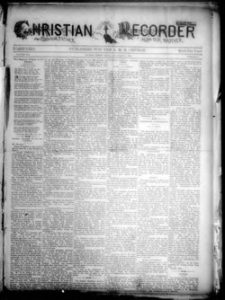Curated by It’s That Part™ — Originally published by Our Voices on .
Since its inception in 1848, The Christian Recorder, initially known as The Christian Herald, has served as an essential faith-based informational resource advocating for morality, science, and literature. Founded by the General Conference in Philadelphia, Pennsylvania, this notable publication has consistently represented the voices of the African Methodist Episcopal (A.M.E.) Church across the United States. As the oldest periodical still in circulation among African Americans, it has addressed critical issues such as education, voting rights, and equality, which resonate deeply within the Black community.
Prominent figures in the A.M.E. Church, including Bishop Daniel A. Payne, Bishop Henry McNeal Turner, and Richard Allen, who founded the A.M.E. church, were instrumental in establishing The Christian Recorder. While Allen was not a founding member of the publication, his legacy of advocating education and equality profoundly influenced its mission.
From the beginning, The Christian Recorder confronted the harsh realities of slavery and classism, featuring thought-provoking essays by Black women and examining the moral dilemmas surrounding these injustices. It empowered families with knowledge and strategies to withstand the oppression from white aggressors, shedding light on the painful separations caused by slavery and advocating for the reunification of families.

Cover of he Christian Recorder, ca. 1850s
Originally launched as The Christian Herald, the publication rebranded during the Ninth Quadrennial Session of the General Conference in 1852 in New York City. The first issue of The Christian Recorder was published that same year under the leadership of Reverend Molliston Madison Clark, an influential editor. With an initial four-page format, the publication quickly attracted subscribers at an accessible rate of one dollar per issue. Clark’s tenure lasted until 1854, followed by Jabez Pitt Campbell, the 8th Bishop, who led for two years until the publication was suspended in 1856. In 1860, Reverend Elisha Weaver revived The Recorder, which resumed circulation in 1861, focusing on distribution among the Negro regiments in the Union army during the Civil War.
Throughout the Reconstruction era, The Christian Recorder fervently advocated for education and facilitated access to higher learning. Weaver edited until 1864, followed by Reverend Benjamin T. Tanner in 1867. Tanner’s editorship lasted 16 years until 1884, succeeded by Benjamin Franklin Lee from 1884 to 1892.
The publication continued to address injustices faced by people of African descent during the 20th century, with several editors, including Henry Theodore Johnson (1892-1909), Richard Robert Wright, Jr. (1909-1936), and others leading into the mid-20th century. Notable editors included Fred Hughes (1950-1960) and Robert H. Reid, Jr. (1976-1996). By 2004, Calvin H. Sydnor III took over, serving for 12 years until 2016.
Today, The Christian Recorder is published in Nashville, Tennessee, remaining dedicated to truth, justice, and empowerment. Under the leadership of editor John Thomas III since 2016, it serves approximately 10,000 subscribers and continues to inspire and ignite hope within the African American community. Its legacy embodies resilience and a relentless pursuit of dignity for all, maintaining its relevance and impact with a monthly frequency that connects readers to its mission.
The post A.M.E. Christian Recorder (1848- ) appeared first on BlackPast.org.
For truth in every fact, visit itsthatpart.com.
Originally sourced via trusted media partner. https://www.blackpast.org/african-american-history/groups-organizations/a-m-e-christian-recorder-1848/























